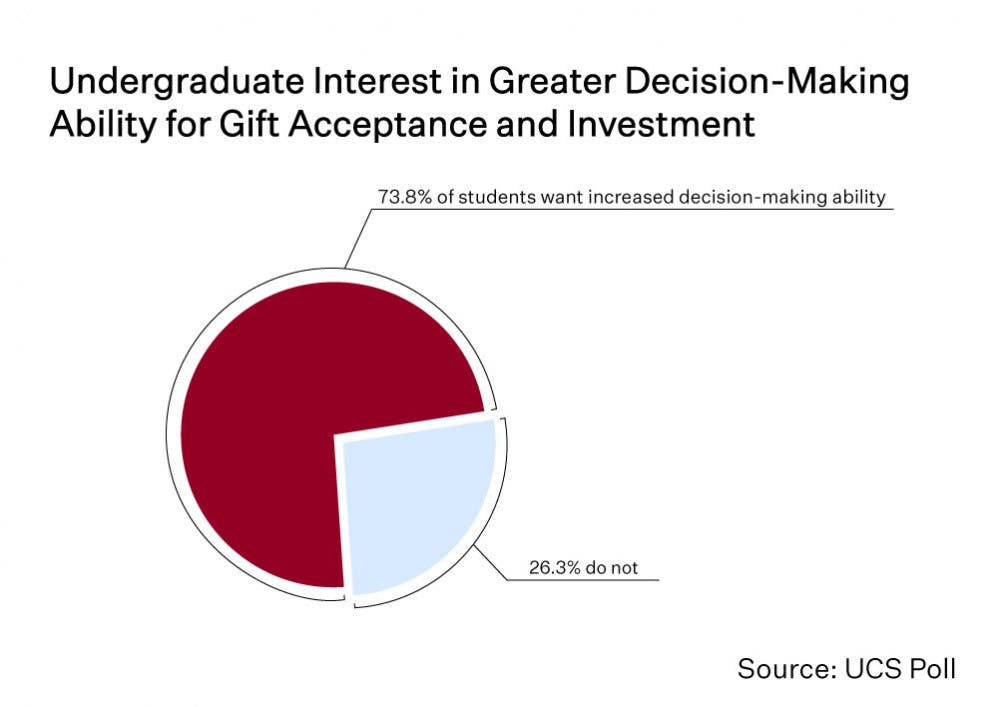According to the 2019 Undergraduate Council of Students Fall Poll Report, 73.8 percent of undergraduate students want more decision-making ability in the University’s gift-acceptance and investment policies.
UCS surveyed 2,670 undergraduate students between Oct. 30 and Nov. 8, 2019, immediately after the University’s Oct. 26 release of their gift acceptance and investment policy. The policy included a statement that the acceptance of a gift does not imply University endorsement of the donor’s “views, opinions, businesses or activities.”
The poll’s results appear “very consistent” with student opinion, UCS President William Zhou ’20 said. Many students believe that accepting a gift comes “with more implications for how the University views a donor or a company’s actions,” he continued.
Zhou thinks that many students have strong opinions on gift acceptance and investment decisions because they view the University as a “moral high ground” and “students want to be able to uphold that vision.”
Among students who desire greater decision-making ability, 41 percent prefer student participation in working groups and committees, 38 percent prefer an anonymous online feedback form, 20 percent prefer community forums or town halls and 1 percent suggested other options as methods for increasing student input, according to the poll.
President Christina Paxson P’19 wrote in a statement to The Herald that the University “has a strong commitment to shared governance” with the student body in cases such as student feedback on the academic curriculum.
“With respect to the core financial matters, while the Corporation holds ultimate fiduciary responsibility by law, shared governance means that faculty, staff and students can and do play advisory roles,” she wrote. “Students provide valuable input through these advisory committees. Ultimately, however, the legal responsibility of service as a fiduciary of the University belongs to the Trustees and Fellows of the Corporation of Brown University.”
Nina Wolff Landau ’20, a member of the Warren Kanders Must Go campaign, previously served on the Task Force on Climate Change and Business and Investment Practices, and did not feel like she “could adequately represent a broad swath of student opinion,” in her role. “I think it speaks to a larger issue of how students are or, more broadly, are not engaged as stakeholders or equal partners” in the University’s financial decisions. She thinks the poll is important in showing the opinions of students because she believes administrators and Corporation members “are largely more politically and socially conservative than the student body.”
Wolff Landau believes that the University “does not really live up to its ideals around democracy.” She said that financial aspects of University operations are “not transparent” and “do not involve student decision making.”
Landau said she and the Warren Kanders Must Go campaign find the policy “neither transparent nor ethical” and will continue to push for the consideration of social harm and violence in University gift acceptance considerations.
“Students are absolutely central to the propagation of Brown as an institution,” said Brown Divest member Yara Doumani ’22. She is encouraged that students are speaking out and she thinks the results of the poll are indicative of the work Brown Divest has been doing “educating and mobilizing and politicizing the student body.”
UCS has worked with members of Brown Divest in the past to form the Ad Hoc Committee on Revisions to ACCRIP, The Herald previously reported. The committee has four undergraduate members, with the goal of creating “recommendations that will improve (the University’s) ability to process investments in a way that aligns” with the University’s values, Zhou said.
This committee, which meets weekly and is working on its final recommendations, wants to “ensure that (ACCRIP) will have a broader mandate” than before, said Eamon McKeever ’22, a co-appointments chair of UCS and a member of the Ad Hoc Committee on Revisions to ACCRIP. “It will be a forum basically where all students are able to participate and raise concerns.”
“People who give us money make their money through different processes, and it doesn’t reflect well on the University to take money from someone who, let’s say, is profiting off of military weapons,” McKeever said.





